| Srl | Item |
| 1 |
ID:
068946
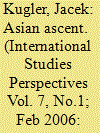

|
|
|
| 2 |
ID:
020355
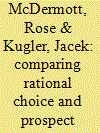

|
|
|
|
|
| Publication |
Sept 2001.
|
| Description |
49-85
|
|
|
|
|
|
|
|
|
|
|
|
|
|
|
|
| 3 |
ID:
137819
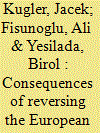

|
|
|
|
|
| Summary/Abstract |
Today, financial crisis once again threatens the unity among member states and future of the European Union. The magnitude of the problem is so grave that observers and analysts have concluded a big decision must be made regarding fiscal union (thus political union) to save EMU. “Is this really the end of the road for Eurozone?” Using Power Transition theory, our analysis shows that trust and relative political capabilities are essential to build a stable Union. While it is clear that the center of global politics is shifting away from Europe and the United States to the Asian giants—the transition from West to East can be effectively planned so that the future units are satisfied with each other rather than distrustful, dissatisfied, and contentious. The slowdown of integration is not simply a regional problem with serious consequences for the economic stability of Europe. Far more importantly, our analysis suggests that the process of integration that has reduced tensions within a region previously characterized by major wars may be declining and that this in and of itself could reset the stage not only for regional confrontations but increase the likelihood that global wars may once more be considered as means to solve disputes. The European Union cannot afford to move from the cooperative contest to a confrontational one where solutions are arrived at by force rather than reason. Therefore, the challenge for European leaders is to resolve the current crisis in the EMU and build upon it a reinvigorated union that once more provides a path for complete regional integration.
|
|
|
|
|
|
|
|
|
|
|
|
|
|
|
|
| 4 |
ID:
119635
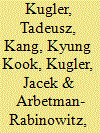

|
|
|
|
|
| Publication |
2013.
|
| Summary/Abstract |
Research on conflict traditionally focuses on its initiation, duration, and severity, but seldom on its consequences. Yet, demographic and economic recovery from the consequences of war lasts far longer and may be more devastating than the waging war. Our concern is with war losses and post-war recovery leading to convergence with pre-war performance. To test this proposition, we choose the most severe international and civil wars after 1920. We find that all belligerents recover or overtake demographic losses incurred in war. Economic assessments differ. The most-developed belligerents recover like a "phoenix" from immense destruction in one generation. For less-developed societies, the outcomes are mixed. The less-developed belligerents recover only a portion of their pre-war performance. The least-developed societies suffer the most and fall into lasting poverty traps. The overlapping generation growth model accounts for such differences in recovery rates based on pre-war performance challenging arguments from Solow's neoclassical growth perspective. Our results imply that foreign aid is incidental to the post-war convergence for the most-developed societies, can prompt recovery for the less-developed societies, and is not effective-unless it is massive and sustained-for the least-developed societies. World War II may provide a poor guide to current post-war challenges in Iraq and in Afghanistan.
|
|
|
|
|
|
|
|
|
|
|
|
|
|
|
|
| 5 |
ID:
038437


|
|
|
|
|
| Publication |
Boulder, Lynne Rienner Publishers, 1987.
|
| Description |
168p.
|
| Series |
GSIS monograph series in world affairs
|
| Standard Number |
1555870554
|
|
|
|
|
|
|
|
|
|
|
|
Copies: C:2/I:0,R:0,Q:0
Circulation
| Accession# | Call# | Current Location | Status | Policy | Location |
| 029354 | 355.0217/KUG 029354 | Main | On Shelf | General | |
| 029750 | 355.0217/KUG 029750 | Main | On Shelf | General | |
|
|
|
|
| 6 |
ID:
059247


|
|
|
| 7 |
ID:
105233
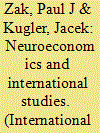

|
|
|
|
|
| Publication |
2011.
|
| Summary/Abstract |
Nearly all political choices depend on trust-or a lack thereof. In world politics, successful negotiations, arms agreements, and deterrence postures all depend on trust. This paper reviews recent findings in neuroeconomics that have identified the neuroactive hormone oxytocin as a key brain mechanism that causes people to trust strangers. This research has also identified the physiologic and behavioral effect of distrust. A neurologically informed formal model of trust is introduced and implications are drawn from it for international studies (IS). We contend that findings in neuroscience and neuroeconomics can be used by social scientists to deepen their understanding of processes such as foreign policy decision making.
|
|
|
|
|
|
|
|
|
|
|
|
|
|
|
|